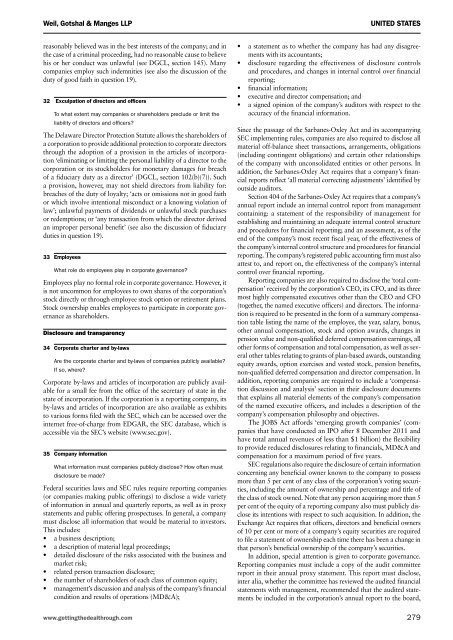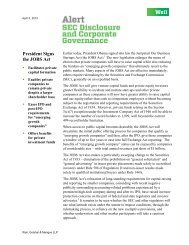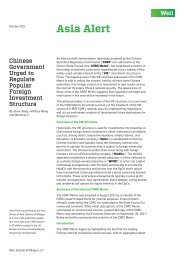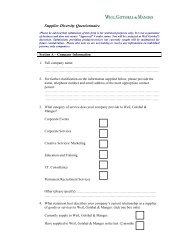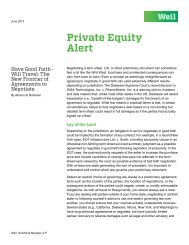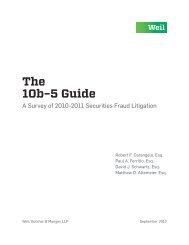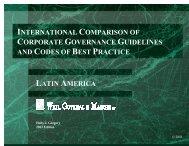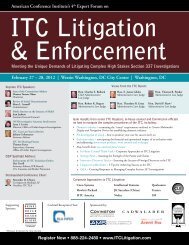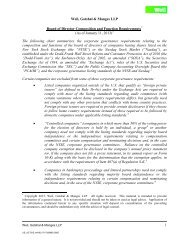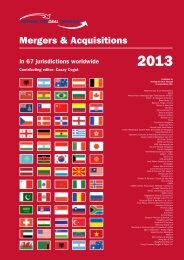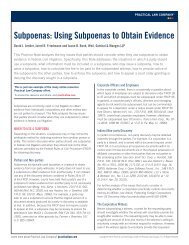Corporate Governance - Weil, Gotshal & Manges
Corporate Governance - Weil, Gotshal & Manges
Corporate Governance - Weil, Gotshal & Manges
Create successful ePaper yourself
Turn your PDF publications into a flip-book with our unique Google optimized e-Paper software.
<strong>Weil</strong>, <strong>Gotshal</strong> & <strong>Manges</strong> LLP<br />
United States<br />
reasonably believed was in the best interests of the company; and in<br />
the case of a criminal proceeding, had no reasonable cause to believe<br />
his or her conduct was unlawful (see DGCL, section 145). Many<br />
companies employ such indemnities (see also the discussion of the<br />
duty of good faith in question 19).<br />
32 Exculpation of directors and officers<br />
To what extent may companies or shareholders preclude or limit the<br />
liability of directors and officers<br />
The Delaware Director Protection Statute allows the shareholders of<br />
a corporation to provide additional protection to corporate directors<br />
through the adoption of a provision in the articles of incorporation<br />
‘eliminating or limiting the personal liability of a director to the<br />
corporation or its stockholders for monetary damages for breach<br />
of a fiduciary duty as a director’ (DGCL, section 102(b)(7)). Such<br />
a provision, however, may not shield directors from liability for:<br />
breaches of the duty of loyalty; ‘acts or omissions not in good faith<br />
or which involve intentional misconduct or a knowing violation of<br />
law’; unlawful payments of dividends or unlawful stock purchases<br />
or redemptions; or ‘any transaction from which the director derived<br />
an improper personal benefit’ (see also the discussion of fiduciary<br />
duties in question 19).<br />
33 Employees<br />
What role do employees play in corporate governance<br />
Employees play no formal role in corporate governance. However, it<br />
is not uncommon for employees to own shares of the corporation’s<br />
stock directly or through employee stock option or retirement plans.<br />
Stock ownership enables employees to participate in corporate governance<br />
as shareholders.<br />
Disclosure and transparency<br />
34 <strong>Corporate</strong> charter and by-laws<br />
Are the corporate charter and by-laws of companies publicly available<br />
If so, where<br />
<strong>Corporate</strong> by-laws and articles of incorporation are publicly available<br />
for a small fee from the office of the secretary of state in the<br />
state of incorporation. If the corporation is a reporting company, its<br />
by-laws and articles of incorporation are also available as exhibits<br />
to various forms filed with the SEC, which can be accessed over the<br />
internet free-of-charge from EDGAR, the SEC database, which is<br />
accessible via the SEC’s website (www.sec.gov).<br />
35 Company information<br />
What information must companies publicly disclose How often must<br />
disclosure be made<br />
Federal securities laws and SEC rules require reporting companies<br />
(or companies making public offerings) to disclose a wide variety<br />
of information in annual and quarterly reports, as well as in proxy<br />
statements and public offering prospectuses. In general, a company<br />
must disclose all information that would be material to investors.<br />
This includes:<br />
• a business description;<br />
• a description of material legal proceedings;<br />
• detailed disclosure of the risks associated with the business and<br />
market risk;<br />
• related person transaction disclosure;<br />
• the number of shareholders of each class of common equity;<br />
• management’s discussion and analysis of the company’s financial<br />
condition and results of operations (MD&A);<br />
• a statement as to whether the company has had any disagreements<br />
with its accountants;<br />
• disclosure regarding the effectiveness of disclosure controls<br />
and procedures, and changes in internal control over financial<br />
reporting;<br />
• financial information;<br />
• executive and director compensation; and<br />
• a signed opinion of the company’s auditors with respect to the<br />
accuracy of the financial information.<br />
Since the passage of the Sarbanes-Oxley Act and its accompanying<br />
SEC implementing rules, companies are also required to disclose all<br />
material off-balance sheet transactions, arrangements, obligations<br />
(including contingent obligations) and certain other relationships<br />
of the company with unconsolidated entities or other persons. In<br />
addition, the Sarbanes-Oxley Act requires that a company’s financial<br />
reports reflect ‘all material correcting adjustments’ identified by<br />
outside auditors.<br />
Section 404 of the Sarbanes-Oxley Act requires that a company’s<br />
annual report include an internal control report from management<br />
containing: a statement of the responsibility of management for<br />
establishing and maintaining an adequate internal control structure<br />
and procedures for financial reporting; and an assessment, as of the<br />
end of the company’s most recent fiscal year, of the effectiveness of<br />
the company’s internal control structure and procedures for financial<br />
reporting. The company’s registered public accounting firm must also<br />
attest to, and report on, the effectiveness of the company’s internal<br />
control over financial reporting.<br />
Reporting companies are also required to disclose the ‘total compensation’<br />
received by the corporation’s CEO, its CFO, and its three<br />
most highly compensated executives other than the CEO and CFO<br />
(together, the named executive officers) and directors. The information<br />
is required to be presented in the form of a summary compensation<br />
table listing the name of the employee, the year, salary, bonus,<br />
other annual compensation, stock and option awards, changes in<br />
pension value and non-qualified deferred compensation earnings, all<br />
other forms of compensation and total compensation, as well as several<br />
other tables relating to grants of plan-based awards, outstanding<br />
equity awards, option exercises and vested stock, pension benefits,<br />
non-qualified deferred compensation and director compensation. In<br />
addition, reporting companies are required to include a ‘compensation<br />
discussion and analysis’ section in their disclosure documents<br />
that explains all material elements of the company’s compensation<br />
of the named executive officers, and includes a description of the<br />
company’s compensation philosophy and objectives.<br />
The JOBS Act affords ‘emerging growth companies’ (companies<br />
that have conducted an IPO after 8 December 2011 and<br />
have total annual revenues of less than $1 billion) the flexibility<br />
to provide reduced disclosures relating to financials, MD&A and<br />
compensation for a maximum period of five years.<br />
SEC regulations also require the disclosure of certain information<br />
concerning any beneficial owner known to the company to possess<br />
more than 5 per cent of any class of the corporation’s voting securities,<br />
including the amount of ownership and percentage and title of<br />
the class of stock owned. Note that any person acquiring more than 5<br />
per cent of the equity of a reporting company also must publicly disclose<br />
its intentions with respect to such acquisition. In addition, the<br />
Exchange Act requires that officers, directors and beneficial owners<br />
of 10 per cent or more of a company’s equity securities are required<br />
to file a statement of ownership each time there has been a change in<br />
that person’s beneficial ownership of the company’s securities.<br />
In addition, special attention is given to corporate governance.<br />
Reporting companies must include a copy of the audit committee<br />
report in their annual proxy statement. This report must disclose,<br />
inter alia, whether the committee has reviewed the audited financial<br />
statements with management, recommended that the audited statements<br />
be included in the corporation’s annual report to the board,<br />
www.gettingthedealthrough.com 279


